Early Childhood Math Learning Plan for 4-5 Year Olds
VerifiedAdded on 2020/04/21
|6
|1314
|155
Homework Assignment
AI Summary
This homework assignment presents a detailed learning plan for teaching mathematics to children aged 4-5 years old in an early childhood education setting. The plan focuses on concepts such as sorting, matching, and size, aligning with the Early Years Learning Framework (EYLF). The rationale emphasizes children's interest in mathematics and its role in developing logical thinking. The plan outlines learning objectives, teacher focus, environment and resources, and assessment strategies. It includes a stage plan with pre-service teacher actions and child activities for introduction, main body, and conclusion phases. The assignment also incorporates evaluation, self-reflection, and follow-up sections to assess the effectiveness of the learning experience and identify areas for improvement. This plan aims to provide a structured and engaging approach to teaching fundamental math concepts to young children.
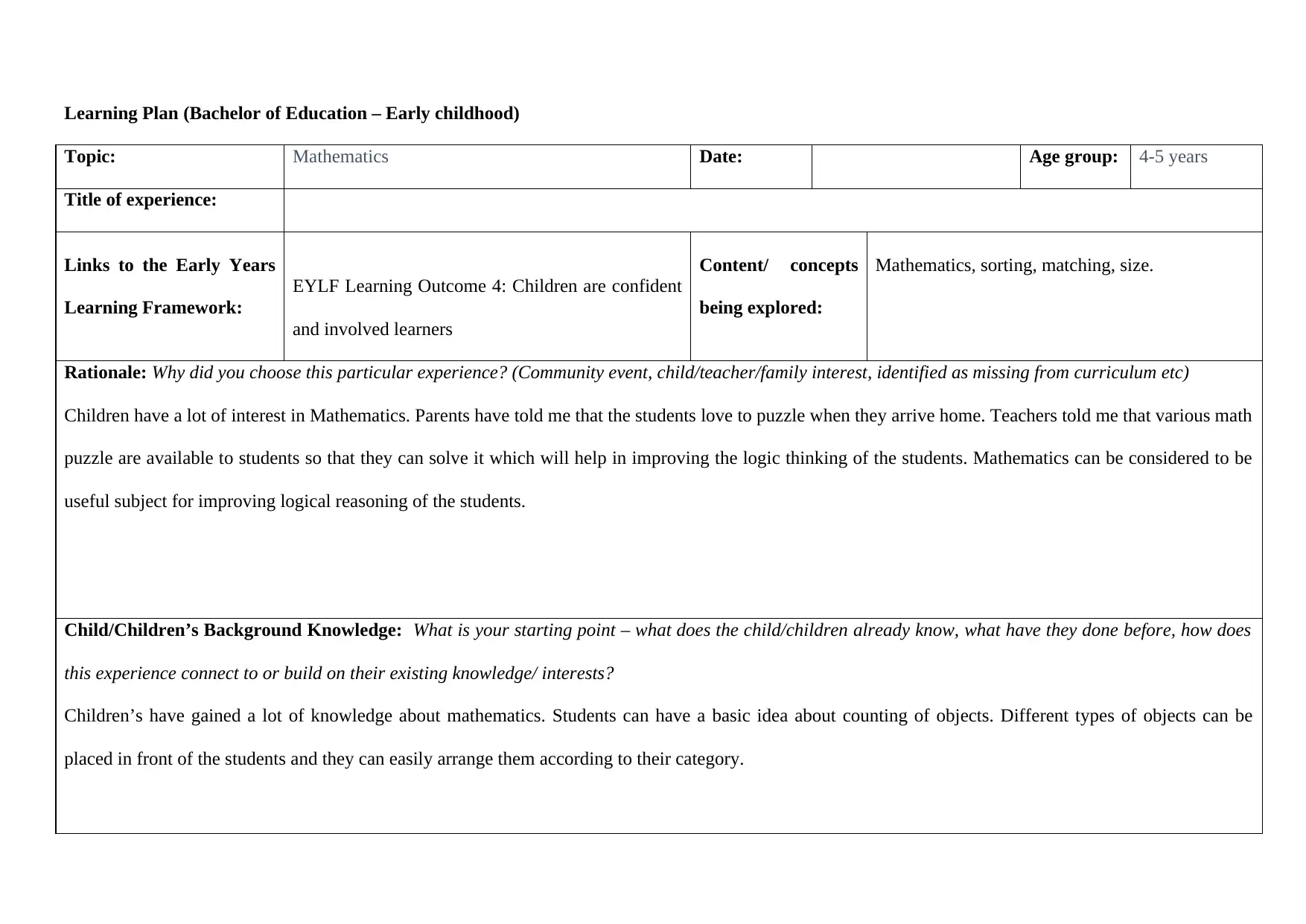
Learning Plan (Bachelor of Education – Early childhood)
Topic: Mathematics Date: Age group: 4-5 years
Title of experience:
Links to the Early Years
Learning Framework:
EYLF Learning Outcome 4: Children are confident
and involved learners
Content/ concepts
being explored:
Mathematics, sorting, matching, size.
Rationale: Why did you choose this particular experience? (Community event, child/teacher/family interest, identified as missing from curriculum etc)
Children have a lot of interest in Mathematics. Parents have told me that the students love to puzzle when they arrive home. Teachers told me that various math
puzzle are available to students so that they can solve it which will help in improving the logic thinking of the students. Mathematics can be considered to be
useful subject for improving logical reasoning of the students.
Child/Children’s Background Knowledge: What is your starting point – what does the child/children already know, what have they done before, how does
this experience connect to or build on their existing knowledge/ interests?
Children’s have gained a lot of knowledge about mathematics. Students can have a basic idea about counting of objects. Different types of objects can be
placed in front of the students and they can easily arrange them according to their category.
Topic: Mathematics Date: Age group: 4-5 years
Title of experience:
Links to the Early Years
Learning Framework:
EYLF Learning Outcome 4: Children are confident
and involved learners
Content/ concepts
being explored:
Mathematics, sorting, matching, size.
Rationale: Why did you choose this particular experience? (Community event, child/teacher/family interest, identified as missing from curriculum etc)
Children have a lot of interest in Mathematics. Parents have told me that the students love to puzzle when they arrive home. Teachers told me that various math
puzzle are available to students so that they can solve it which will help in improving the logic thinking of the students. Mathematics can be considered to be
useful subject for improving logical reasoning of the students.
Child/Children’s Background Knowledge: What is your starting point – what does the child/children already know, what have they done before, how does
this experience connect to or build on their existing knowledge/ interests?
Children’s have gained a lot of knowledge about mathematics. Students can have a basic idea about counting of objects. Different types of objects can be
placed in front of the students and they can easily arrange them according to their category.
Paraphrase This Document
Need a fresh take? Get an instant paraphrase of this document with our AI Paraphraser
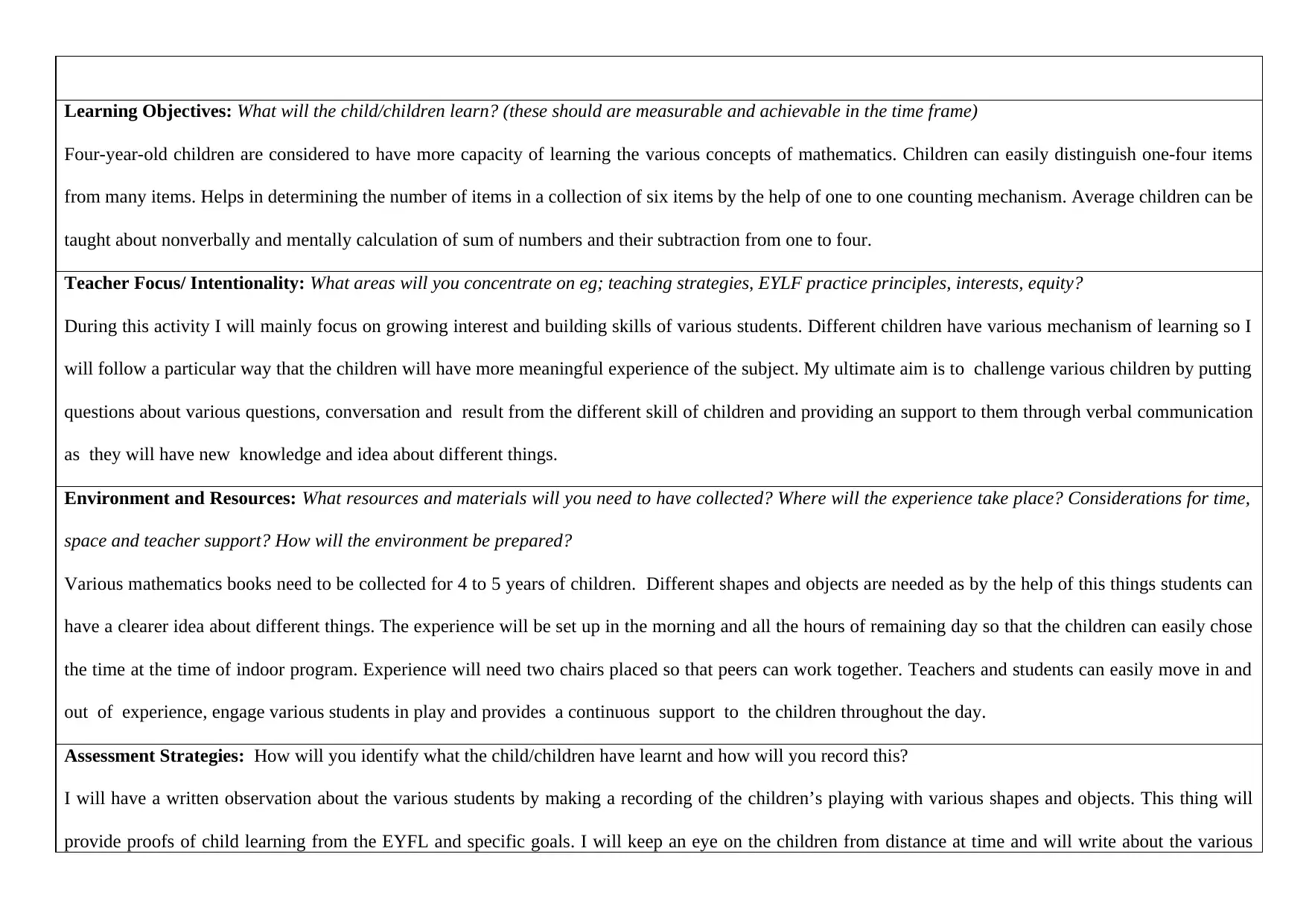
Learning Objectives: What will the child/children learn? (these should are measurable and achievable in the time frame)
Four-year-old children are considered to have more capacity of learning the various concepts of mathematics. Children can easily distinguish one-four items
from many items. Helps in determining the number of items in a collection of six items by the help of one to one counting mechanism. Average children can be
taught about nonverbally and mentally calculation of sum of numbers and their subtraction from one to four.
Teacher Focus/ Intentionality: What areas will you concentrate on eg; teaching strategies, EYLF practice principles, interests, equity?
During this activity I will mainly focus on growing interest and building skills of various students. Different children have various mechanism of learning so I
will follow a particular way that the children will have more meaningful experience of the subject. My ultimate aim is to challenge various children by putting
questions about various questions, conversation and result from the different skill of children and providing an support to them through verbal communication
as they will have new knowledge and idea about different things.
Environment and Resources: What resources and materials will you need to have collected? Where will the experience take place? Considerations for time,
space and teacher support? How will the environment be prepared?
Various mathematics books need to be collected for 4 to 5 years of children. Different shapes and objects are needed as by the help of this things students can
have a clearer idea about different things. The experience will be set up in the morning and all the hours of remaining day so that the children can easily chose
the time at the time of indoor program. Experience will need two chairs placed so that peers can work together. Teachers and students can easily move in and
out of experience, engage various students in play and provides a continuous support to the children throughout the day.
Assessment Strategies: How will you identify what the child/children have learnt and how will you record this?
I will have a written observation about the various students by making a recording of the children’s playing with various shapes and objects. This thing will
provide proofs of child learning from the EYFL and specific goals. I will keep an eye on the children from distance at time and will write about the various
Four-year-old children are considered to have more capacity of learning the various concepts of mathematics. Children can easily distinguish one-four items
from many items. Helps in determining the number of items in a collection of six items by the help of one to one counting mechanism. Average children can be
taught about nonverbally and mentally calculation of sum of numbers and their subtraction from one to four.
Teacher Focus/ Intentionality: What areas will you concentrate on eg; teaching strategies, EYLF practice principles, interests, equity?
During this activity I will mainly focus on growing interest and building skills of various students. Different children have various mechanism of learning so I
will follow a particular way that the children will have more meaningful experience of the subject. My ultimate aim is to challenge various children by putting
questions about various questions, conversation and result from the different skill of children and providing an support to them through verbal communication
as they will have new knowledge and idea about different things.
Environment and Resources: What resources and materials will you need to have collected? Where will the experience take place? Considerations for time,
space and teacher support? How will the environment be prepared?
Various mathematics books need to be collected for 4 to 5 years of children. Different shapes and objects are needed as by the help of this things students can
have a clearer idea about different things. The experience will be set up in the morning and all the hours of remaining day so that the children can easily chose
the time at the time of indoor program. Experience will need two chairs placed so that peers can work together. Teachers and students can easily move in and
out of experience, engage various students in play and provides a continuous support to the children throughout the day.
Assessment Strategies: How will you identify what the child/children have learnt and how will you record this?
I will have a written observation about the various students by making a recording of the children’s playing with various shapes and objects. This thing will
provide proofs of child learning from the EYFL and specific goals. I will keep an eye on the children from distance at time and will write about the various
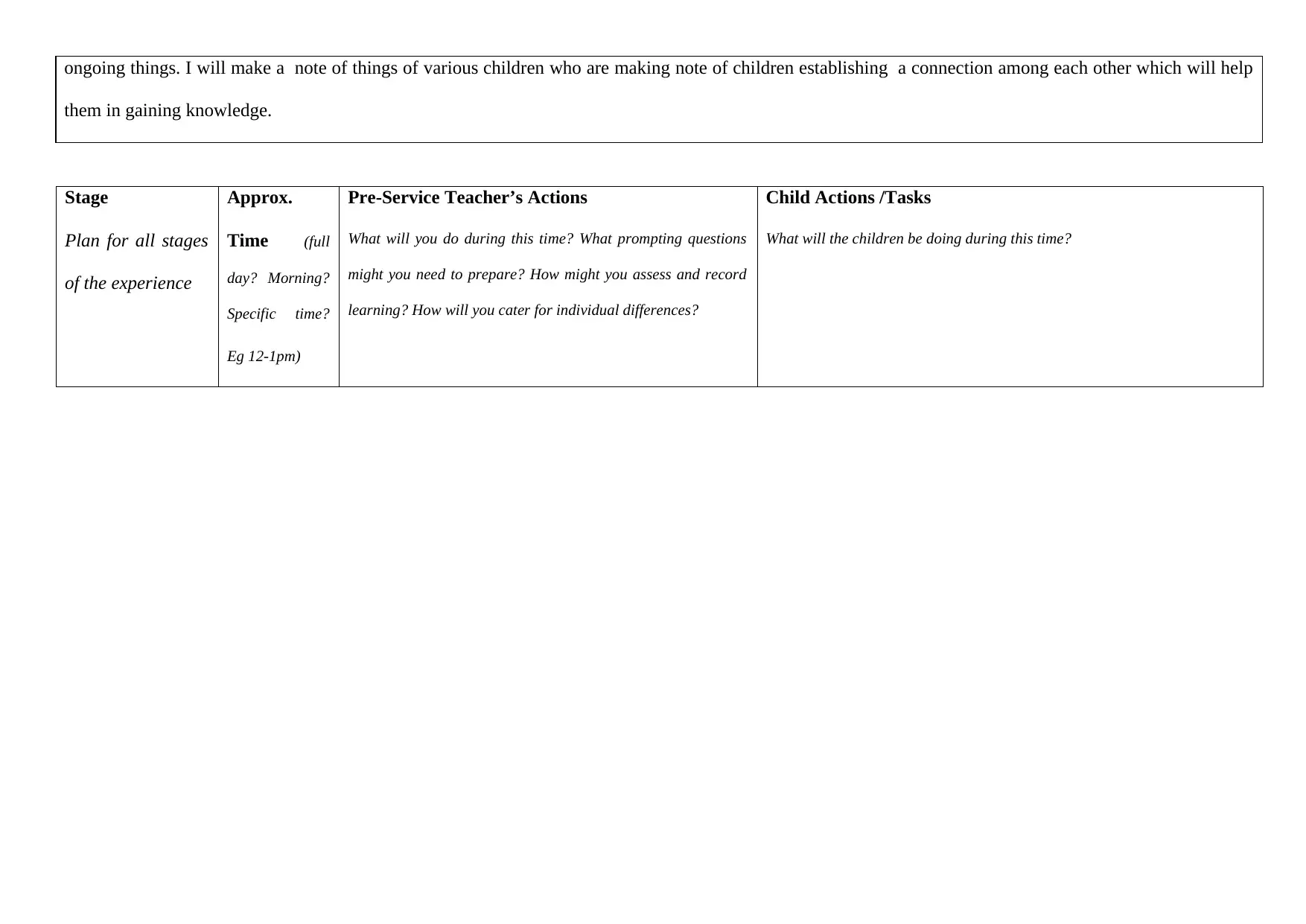
ongoing things. I will make a note of things of various children who are making note of children establishing a connection among each other which will help
them in gaining knowledge.
Stage
Plan for all stages
of the experience
Approx.
Time (full
day? Morning?
Specific time?
Eg 12-1pm)
Pre-Service Teacher’s Actions
What will you do during this time? What prompting questions
might you need to prepare? How might you assess and record
learning? How will you cater for individual differences?
Child Actions /Tasks
What will the children be doing during this time?
them in gaining knowledge.
Stage
Plan for all stages
of the experience
Approx.
Time (full
day? Morning?
Specific time?
Eg 12-1pm)
Pre-Service Teacher’s Actions
What will you do during this time? What prompting questions
might you need to prepare? How might you assess and record
learning? How will you cater for individual differences?
Child Actions /Tasks
What will the children be doing during this time?
⊘ This is a preview!⊘
Do you want full access?
Subscribe today to unlock all pages.

Trusted by 1+ million students worldwide
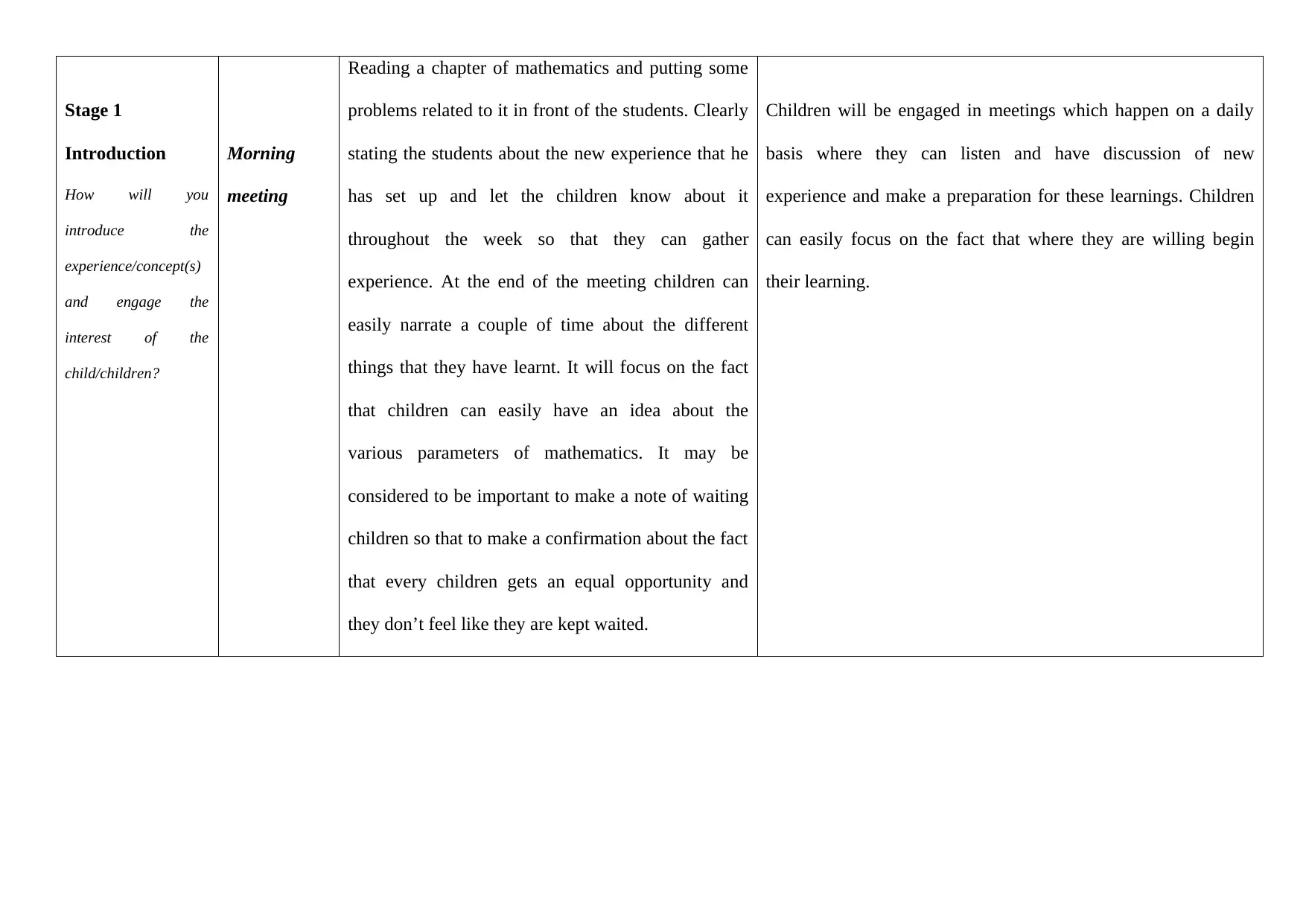
Stage 1
Introduction
How will you
introduce the
experience/concept(s)
and engage the
interest of the
child/children?
Morning
meeting
Reading a chapter of mathematics and putting some
problems related to it in front of the students. Clearly
stating the students about the new experience that he
has set up and let the children know about it
throughout the week so that they can gather
experience. At the end of the meeting children can
easily narrate a couple of time about the different
things that they have learnt. It will focus on the fact
that children can easily have an idea about the
various parameters of mathematics. It may be
considered to be important to make a note of waiting
children so that to make a confirmation about the fact
that every children gets an equal opportunity and
they don’t feel like they are kept waited.
Children will be engaged in meetings which happen on a daily
basis where they can listen and have discussion of new
experience and make a preparation for these learnings. Children
can easily focus on the fact that where they are willing begin
their learning.
Introduction
How will you
introduce the
experience/concept(s)
and engage the
interest of the
child/children?
Morning
meeting
Reading a chapter of mathematics and putting some
problems related to it in front of the students. Clearly
stating the students about the new experience that he
has set up and let the children know about it
throughout the week so that they can gather
experience. At the end of the meeting children can
easily narrate a couple of time about the different
things that they have learnt. It will focus on the fact
that children can easily have an idea about the
various parameters of mathematics. It may be
considered to be important to make a note of waiting
children so that to make a confirmation about the fact
that every children gets an equal opportunity and
they don’t feel like they are kept waited.
Children will be engaged in meetings which happen on a daily
basis where they can listen and have discussion of new
experience and make a preparation for these learnings. Children
can easily focus on the fact that where they are willing begin
their learning.
Paraphrase This Document
Need a fresh take? Get an instant paraphrase of this document with our AI Paraphraser
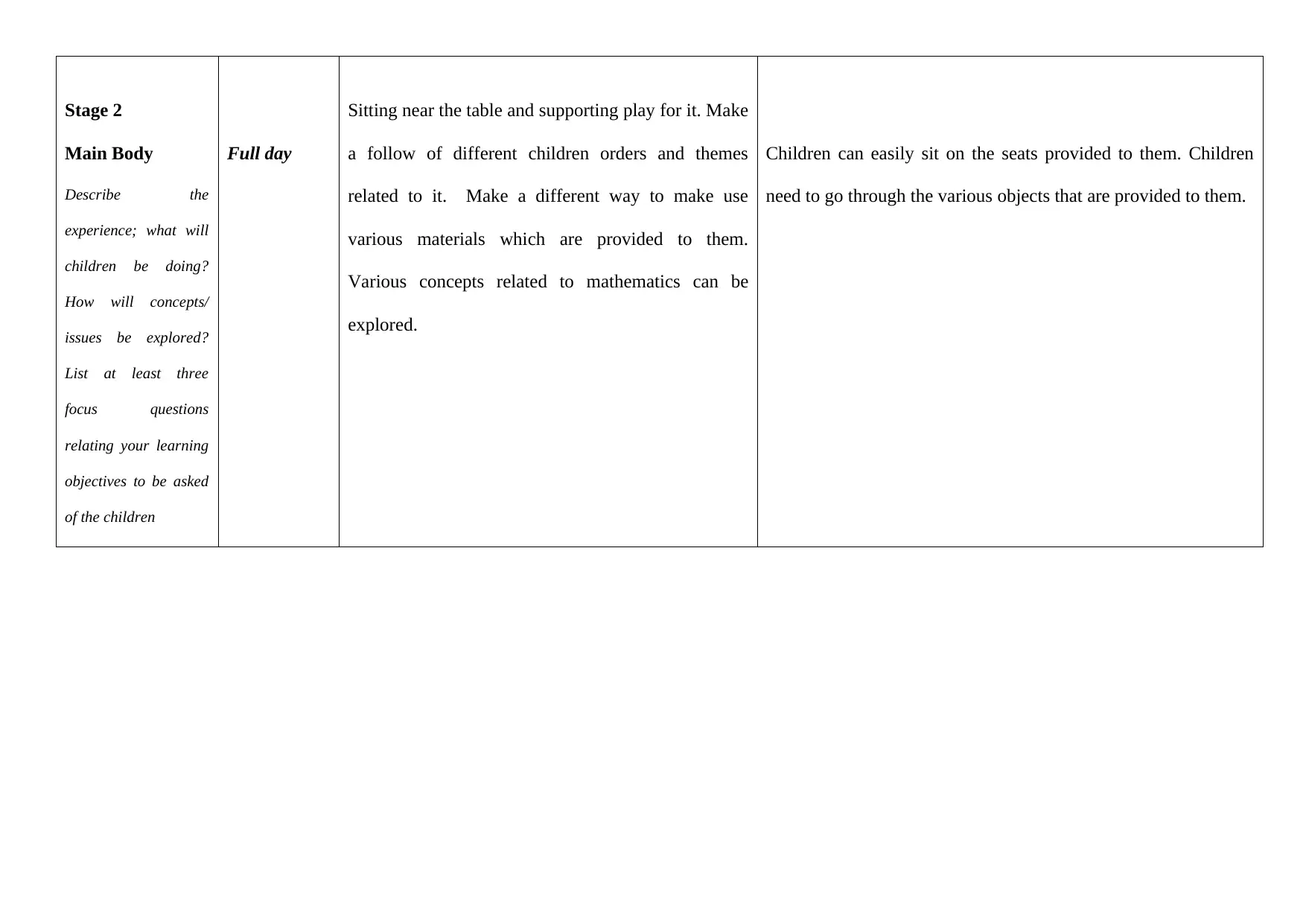
Stage 2
Main Body
Describe the
experience; what will
children be doing?
How will concepts/
issues be explored?
List at least three
focus questions
relating your learning
objectives to be asked
of the children
Full day
Sitting near the table and supporting play for it. Make
a follow of different children orders and themes
related to it. Make a different way to make use
various materials which are provided to them.
Various concepts related to mathematics can be
explored.
Children can easily sit on the seats provided to them. Children
need to go through the various objects that are provided to them.
Main Body
Describe the
experience; what will
children be doing?
How will concepts/
issues be explored?
List at least three
focus questions
relating your learning
objectives to be asked
of the children
Full day
Sitting near the table and supporting play for it. Make
a follow of different children orders and themes
related to it. Make a different way to make use
various materials which are provided to them.
Various concepts related to mathematics can be
explored.
Children can easily sit on the seats provided to them. Children
need to go through the various objects that are provided to them.
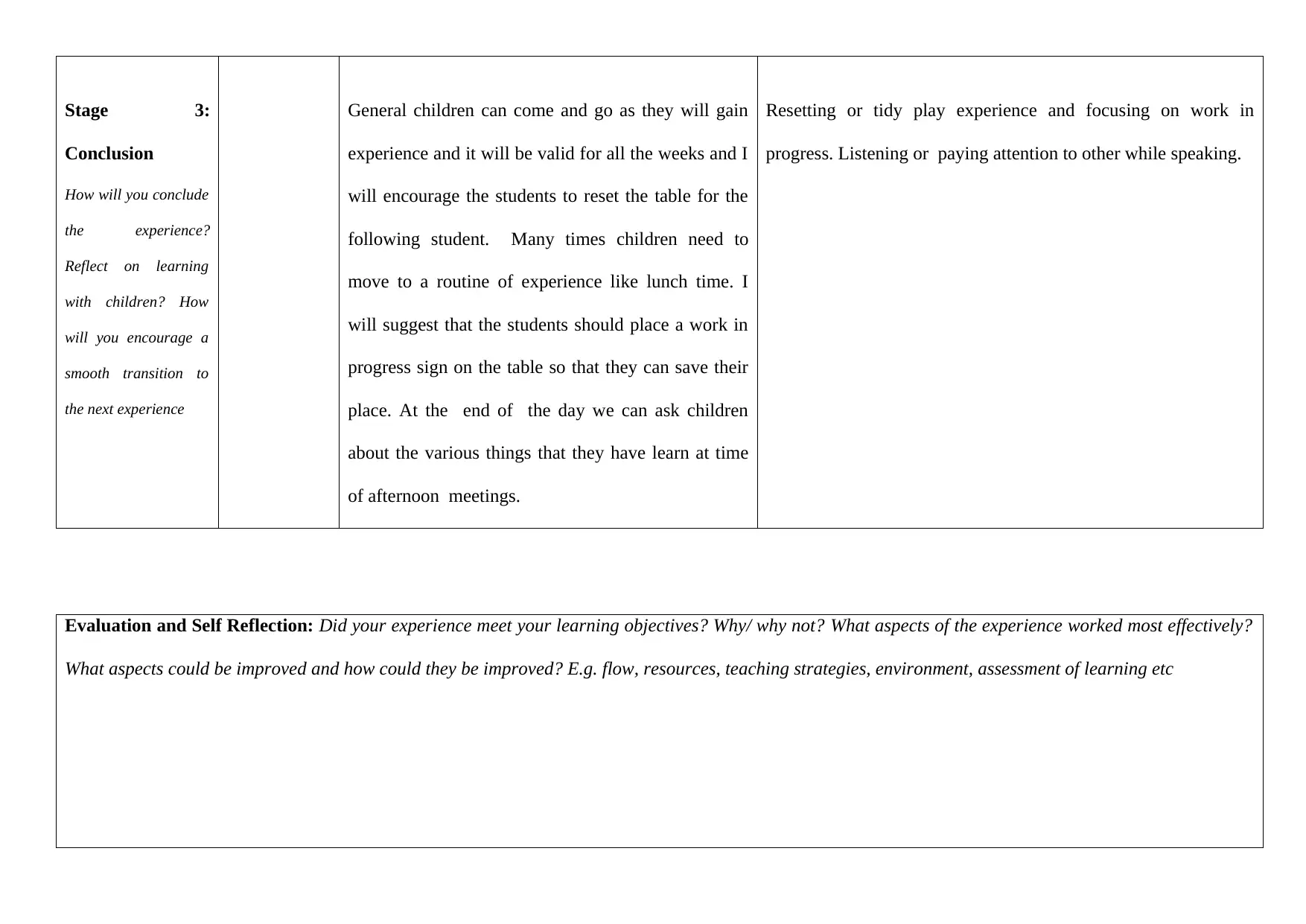
Stage 3:
Conclusion
How will you conclude
the experience?
Reflect on learning
with children? How
will you encourage a
smooth transition to
the next experience
General children can come and go as they will gain
experience and it will be valid for all the weeks and I
will encourage the students to reset the table for the
following student. Many times children need to
move to a routine of experience like lunch time. I
will suggest that the students should place a work in
progress sign on the table so that they can save their
place. At the end of the day we can ask children
about the various things that they have learn at time
of afternoon meetings.
Resetting or tidy play experience and focusing on work in
progress. Listening or paying attention to other while speaking.
Evaluation and Self Reflection: Did your experience meet your learning objectives? Why/ why not? What aspects of the experience worked most effectively?
What aspects could be improved and how could they be improved? E.g. flow, resources, teaching strategies, environment, assessment of learning etc
Conclusion
How will you conclude
the experience?
Reflect on learning
with children? How
will you encourage a
smooth transition to
the next experience
General children can come and go as they will gain
experience and it will be valid for all the weeks and I
will encourage the students to reset the table for the
following student. Many times children need to
move to a routine of experience like lunch time. I
will suggest that the students should place a work in
progress sign on the table so that they can save their
place. At the end of the day we can ask children
about the various things that they have learn at time
of afternoon meetings.
Resetting or tidy play experience and focusing on work in
progress. Listening or paying attention to other while speaking.
Evaluation and Self Reflection: Did your experience meet your learning objectives? Why/ why not? What aspects of the experience worked most effectively?
What aspects could be improved and how could they be improved? E.g. flow, resources, teaching strategies, environment, assessment of learning etc
⊘ This is a preview!⊘
Do you want full access?
Subscribe today to unlock all pages.

Trusted by 1+ million students worldwide
1 out of 6
Related Documents
Your All-in-One AI-Powered Toolkit for Academic Success.
+13062052269
info@desklib.com
Available 24*7 on WhatsApp / Email
![[object Object]](/_next/static/media/star-bottom.7253800d.svg)
Unlock your academic potential
Copyright © 2020–2026 A2Z Services. All Rights Reserved. Developed and managed by ZUCOL.





